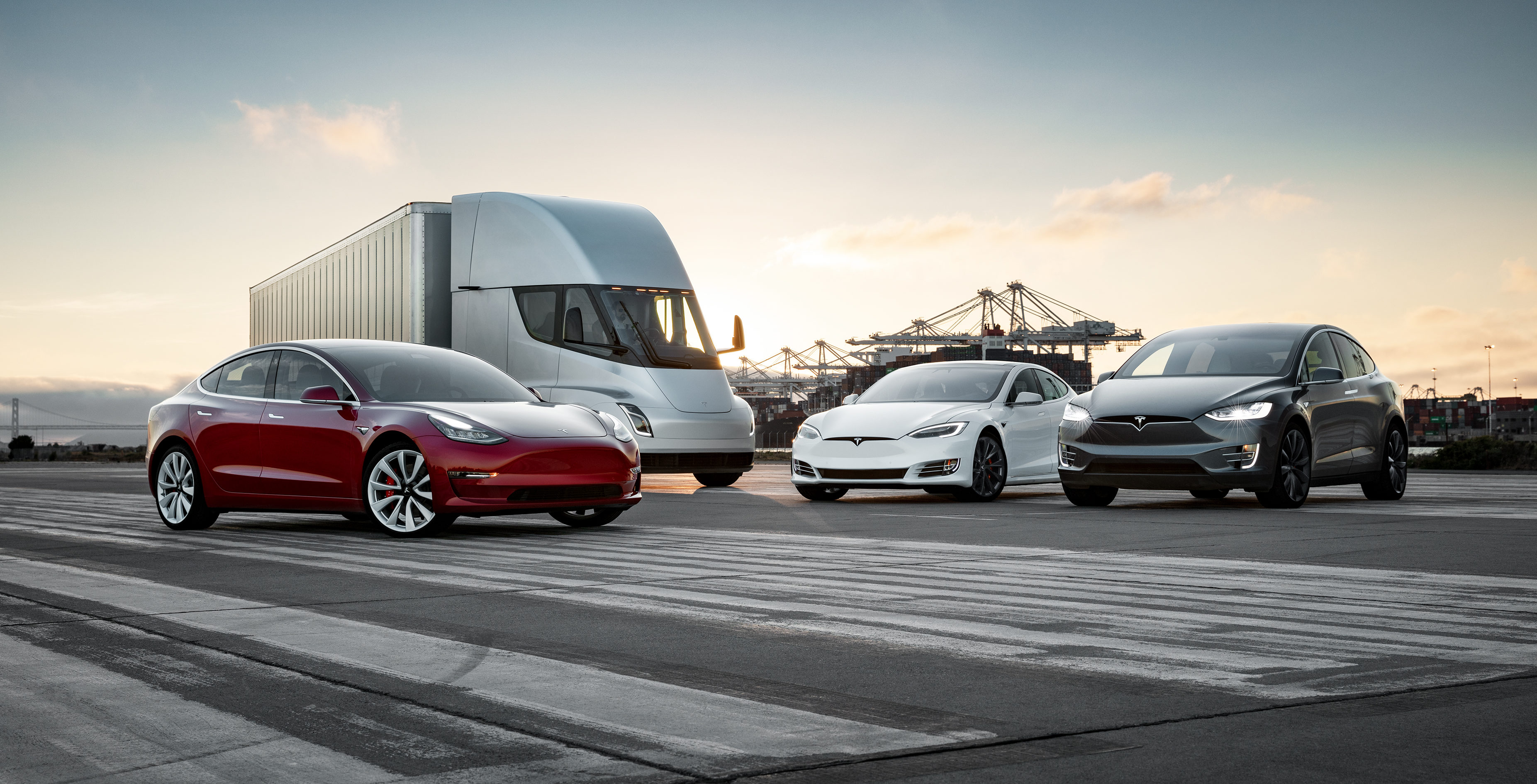

Investor's Corner
The ‘Tesla Effect’ is starting to extend from legacy carmakers to the oil industry
Back in February, self-made billionaire Don Gao from China mentioned that the “Tesla Effect” continues to grow even in markets beyond the California-based company’s reach. Gao, who owns Positec – a maker of power equipment – uses lithium-ion batteries for his company’s products, and they are steadily becoming a potent rival for heavyweight brands like Black & Decker. The billionaire entrepreneur noted that Tesla’s commitment to battery tech is spilling over into other industries, to the point where consumers’ perception of battery-powered devices is now changing.
“This Tesla Effect is a major trend and has really changed consumers’ perception of things that are battery driven and their capabilities,” he said.
Tesla did not come up with the electric car, nor did it come up with lithium-ion batteries. Both technologies were present even before the company was founded. That said, and partly thanks to the unraveling of Elon Musk’s first Master Plan, Tesla was able to capture an audience and a dedicated consumer base with its first vehicle – the Tesla Roadster. The small sports car was mostly a proof-of-concept, in the way that it was intended to show that electric cars need not be boring or limited in range. The car was successful enough that Tesla was able to follow it up with the Model S, a vehicle designed from the ground up to be a high-performance, long-range electric car. The rest is history.
Tesla’s electric cars were able to capture the interest of car buyers, even those that are particular about power and performance. It should be noted that Tesla’s electric cars were showing strong sales even before the company rolled out features like Autopilot. The company’s electric vehicles, from the Model S, to the Model X, to the Model 3, were desirable simply because they were excellent cars. They just happen to be powered by electricity instead of gas.

Since Tesla is still in the process of growing, its electric cars have been competing in the luxury segment. The electric vehicles themselves are not traditional luxury cars, with their minimalistic and almost spartan interiors, but they do provide a premium experience through their deep integration of software and hardware. Over the years, Tesla’s electric cars sold well, until such time that they started outselling mainstays from legacy carmakers like BMW and Mercedes-Benz. The Tesla Model 3, the company’s first attempt at a mass-market car, was recently listed as the 4th best-selling passenger car in the US, beating out competitors from the luxury midsize segment like the Mercedes-Benz C-Class.
In the same way that companies unrelated to Tesla are starting to explore the potential of lithium-ion batteries partly due to the electric car maker, a number of legacy automakers have accelerated their transition to electrified transport as well. Among the German carmakers, several have expressed their intent to come up with their own premium electric vehicles. Mercedes-Benz has the EQ program, Volkswagen just announced that it is investing ~$7 billion into e-mobility, and Porsche has the Taycan, a high-performance electric car that’s set to meet the Model S head-on in the premium EV market. Most of these carmakers would likely not acknowledge it, but there is little doubt that the transition to electrified transport was expedited by the efforts of a small electric car startup from Silicon Valley.
In a way, the Tesla Effect is happening at the perfect time. Several regions in the world are shifting towards cleaner forms of transportation. China plans to eventually ban diesel and gasoline-powered cars in its major cities. France and Britain have both committed to banning gas-powered automobiles in the future as well. Earlier this month, the EU Parliament voted for a 20% cut in CO2 emissions from new cars and vans in 2025 and a 40% reduction in 2030, accelerating the region’s transition towards cleaner transport. To effectively support the transition, carmakers, from startups like Tesla to pedigreed veterans like Mercedes-Benz, have to ramp their efforts at creating even more compelling, cost-effective electric vehicles.

In a recent segment on CNBC, Paul Sankey of Mizuho Securities mentioned that the “Tesla Effect” is starting to make its way to the oil industry as well. Last Thursday, oil prices tumbled as much as 4% amidst concerns about the fallout from the United States’ sanctions on Iran, the OPEC’s third-biggest crude oil producer. Wall St. analysts noted that oil could be in striking distance of $100 per barrel – an adjustment that would be felt by owners of fossil fuel-powered cars. The Mizuho analyst noted that part of the reasons behind the struggles of the oil industry is the shifting perception towards oil itself.
“Essentially, the big issue is the so-called “Tesla Effect,” the general “End of the Oil Age” theme that is a problem for these (oil) stocks. As the oil price goes up, especially to the levels we’re at now and potentially beyond, it’s almost as if the Tesla Effect could be exacerbated by the potential for higher oil prices to accelerate the end of the Oil Age. The Tesla Effect is the overall concept that (while) the 20th century was driven by oil, the 21st century will be driven by electricity. There’s a 30-year transition, and we’re somewhere probably 10 years into that transition. Ultimately, (the) terminal value of oil has been severely affected by the potential for us to change behavior,” the analyst said.
What is quite remarkable is that Tesla is nowhere close to reaching the company’s overall goals. Elon Musk once noted that Tesla would not stop until all cars in the road are electric. And the truth is, even if the company reaches its production targets for the Model 3 and the Model Y and its future Truck and compact sedan, Tesla would not be able to transition the auto industry towards electrification on its own. What Tesla could do, though, is to accelerate this transition, and if recent projects by legacy carmakers are any indication, it appears that the Silicon Valley-based company is doing just that.
Elon Musk
Tesla analyst issues stern warning to investors: forget Trump-Musk feud

A Tesla analyst today said that investors should not lose sight of what is truly important in the grand scheme of being a shareholder, and that any near-term drama between CEO Elon Musk and U.S. President Donald Trump should not outshine the progress made by the company.
Gene Munster of Deepwater Management said that Tesla’s progress in autonomy is a much larger influence and a significantly bigger part of the company’s story than any disagreement between political policies.
Munster appeared on CNBC‘s “Closing Bell” yesterday to reiterate this point:
“One thing that is critical for Tesla investors to remember is that what’s going on with the business, with autonomy, the progress that they’re making, albeit early, is much bigger than any feud that is going to happen week-to-week between the President and Elon. So, I understand the reaction, but ultimately, I think that cooler heads will prevail. If they don’t, autonomy is still coming, one way or the other.”
BREAKING: GENE MUNSTER SAYS — $TSLA AUTONOMY IS “MUCH BIGGER” THAN ANY FEUD 👀
He says robotaxis are coming regardless ! pic.twitter.com/ytpPcwUTFy
— TheSonOfWalkley (@TheSonOfWalkley) July 2, 2025
This is a point that other analysts like Dan Ives of Wedbush and Cathie Wood of ARK Invest also made yesterday.
On two occasions over the past month, Musk and President Trump have gotten involved in a very public disagreement over the “Big Beautiful Bill,” which officially passed through the Senate yesterday and is making its way to the House of Representatives.
Musk is upset with the spending in the bill, while President Trump continues to reiterate that the Tesla CEO is only frustrated with the removal of an “EV mandate,” which does not exist federally, nor is it something Musk has expressed any frustration with.
In fact, Musk has pushed back against keeping federal subsidies for EVs, as long as gas and oil subsidies are also removed.
Nevertheless, Ives and Wood both said yesterday that they believe the political hardship between Musk and President Trump will pass because both realize the world is a better place with them on the same team.
Munster’s perspective is that, even though Musk’s feud with President Trump could apply near-term pressure to the stock, the company’s progress in autonomy is an indication that, in the long term, Tesla is set up to succeed.
Tesla launched its Robotaxi platform in Austin on June 22 and is expanding access to more members of the public. Austin residents are now reporting that they have been invited to join the program.
Elon Musk
Tesla surges following better-than-expected delivery report
Tesla saw some positive momentum during trading hours as it reported its deliveries for Q2.

Tesla (NASDAQ: TSLA) surged over four percent on Wednesday morning after the company reported better-than-expected deliveries. It was nearly right on consensus estimations, as Wall Street predicted the company would deliver 385,000 cars in Q2.
Tesla reported that it delivered 384,122 vehicles in Q2. Many, including those inside the Tesla community, were anticipating deliveries in the 340,000 to 360,000 range, while Wall Street seemed to get it just right.
Tesla delivers 384,000 vehicles in Q2 2025, deploys 9.6 GWh in energy storage
Despite Tesla meeting consensus estimations, there were real concerns about what the company would report for Q2.
There were reportedly brief pauses in production at Gigafactory Texas during the quarter and the ramp of the new Model Y configuration across the globe were expected to provide headwinds for the EV maker during the quarter.
At noon on the East Coast, Tesla shares were up about 4.5 percent.
It is expected that Tesla will likely equal the number of deliveries it completed in both of the past two years.
It has hovered at the 1.8 million mark since 2023, and it seems it is right on pace to match that once again. Early last year, Tesla said that annual growth would be “notably lower” than expected due to its development of a new vehicle platform, which will enable more affordable models to be offered to the public.
These cars are expected to be unveiled at some point this year, as Tesla said they were “on track” to be produced in the first half of the year. Tesla has yet to unveil these vehicle designs to the public.
Dan Ives of Wedbush said in a note to investors this morning that the company’s rebound in China in June reflects good things to come, especially given the Model Y and its ramp across the world.
He also said that Musk’s commitment to the company and return from politics played a major role in the company’s performance in Q2:
“If Musk continues to lead and remain in the driver’s seat, we believe Tesla is on a path to an accelerated growth path over the coming years with deliveries expected to ramp in the back-half of 2025 following the Model Y refresh cycle.”
Ives maintained his $500 price target and the ‘Outperform’ rating he held on the stock:
“Tesla’s future is in many ways the brightest it’s ever been in our view given autonomous, FSD, robotics, and many other technology innovations now on the horizon with 90% of the valuation being driven by autonomous and robotics over the coming years but Musk needs to focus on driving Tesla and not putting his political views first. We maintain our OUTPERFORM and $500 PT.”
Moving forward, investors will look to see some gradual growth over the next few quarters. At worst, Tesla should look to match 2023 and 2024 full-year delivery figures, which could be beaten if the automaker can offer those affordable models by the end of the year.
Investor's Corner
Tesla delivers 384,000 vehicles in Q2 2025, deploys 9.6 GWh in energy storage
The quarter’s 9.6 GWh energy storage deployment marks one of Tesla’s highest to date.

Tesla (NASDAQ: TSLA) has released its Q2 2025 vehicle delivery and production report. As per the report, the company delivered over 384,000 vehicles in the second quarter of 2025, while deploying 9.6 GWh in energy storage. Vehicle production also reached 410,244 units for the quarter.
Model 3/Y dominates output, ahead of earnings call
Of the 410,244 vehicles produced during the quarter, 396,835 were Model 3 and Model Y units, while 13,409 were attributed to Tesla’s other models, which includes the Cybertruck and Model S/X variants. Deliveries followed a similar pattern, with 373,728 Model 3/Ys delivered and 10,394 from other models, totaling 384,122.
The quarter’s 9.6 GWh energy storage deployment marks one of Tesla’s highest to date, signaling continued strength in the Megapack and Powerwall segments.

Year-on-year deliveries edge down, but energy shows resilience
Tesla will share its full Q2 2025 earnings results after the market closes on Wednesday, July 23, 2025, with a live earnings call scheduled for 4:30 p.m. CT / 5:30 p.m. ET. The company will publish its quarterly update at ir.tesla.com, followed by a Q&A webcast featuring company leadership. Executives such as CEO Elon Musk are expected to be in attendance.
Tesla investors are expected to inquire about several of the company’s ongoing projects in the upcoming Q2 2025 earnings call. Expected topics include the new Model Y ramp across the United States, China, and Germany, as well as the ramp of FSD in territories outside the US and China. Questions about the company’s Robotaxi business, as well as the long-referenced but yet to be announced affordable models are also expected.
-

 Elon Musk2 days ago
Elon Musk2 days agoTesla investors will be shocked by Jim Cramer’s latest assessment
-

 News1 week ago
News1 week agoTesla Robotaxi’s biggest challenge seems to be this one thing
-

 Elon Musk2 weeks ago
Elon Musk2 weeks agoElon Musk slams Bloomberg’s shocking xAI cash burn claims
-

 News2 weeks ago
News2 weeks agoTexas lawmakers urge Tesla to delay Austin robotaxi launch to September
-

 Elon Musk1 week ago
Elon Musk1 week agoFirst Look at Tesla’s Robotaxi App: features, design, and more
-

 Elon Musk2 weeks ago
Elon Musk2 weeks agoTesla Robotaxis are becoming a common sight on Austin’s public roads
-

 Elon Musk2 weeks ago
Elon Musk2 weeks agoxAI’s Grok 3 partners with Oracle Cloud for corporate AI innovation
-

 Elon Musk2 weeks ago
Elon Musk2 weeks agoSpaceX President meets India Minister after Starlink approval















